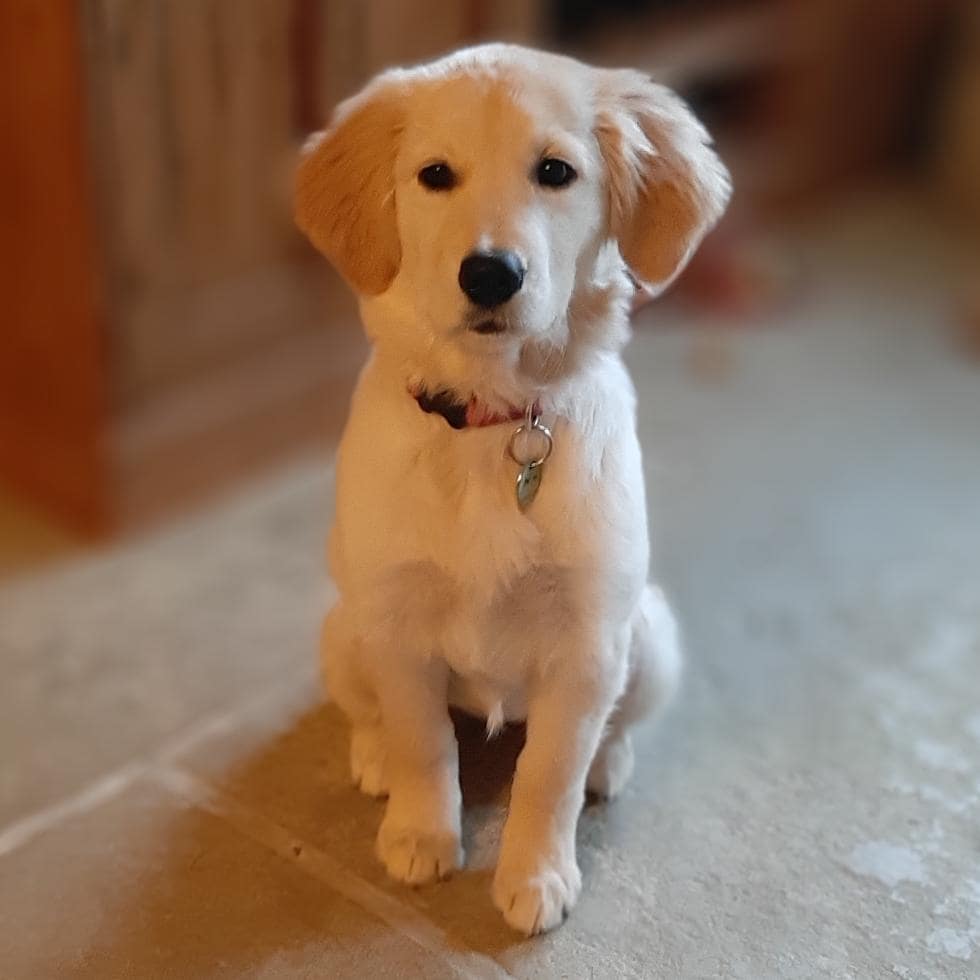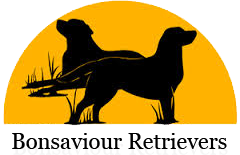
Is Your Puppy Biting?
You are bound to want to know when your biting puppy will grow out of this phase and how you can speed that process up.
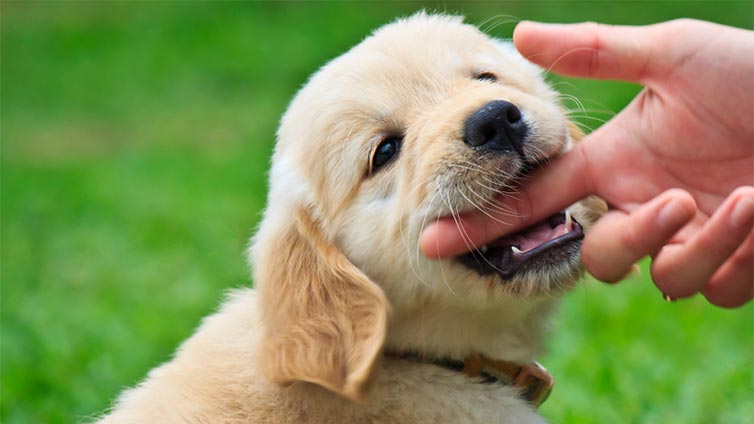
Biting, as you will have discovered is usually accompanied by lots of noise!
And if you are like many other puppy owners you will also want to reassured that your puppy isn’t turning mean or aggressive.
Why do puppies bite?
So why do puppies bite? Whether you’re experiencing a 4 month old puppy biting, a 5 month old puppy biting, or even an older puppy!
Puppies may bite or more likely ‘chew’ on things to relieve the irritation in their jaws when they are teething.
But the kind of biting that worries people the most, the biting that is often accompanied by growling and tugging, is almost always play biting
Puppies naturally bite one another in play, and when you bring your puppy home, he’ll do the same with you.
To him, it’s all a game, and he has no idea that is hurts or upsets you.
My puppy is biting hard
Puppies do bite hard and it does hurt. But I want to reassure you that even at 8 weeks old, your puppy has learned to moderate his bite in play.
Puppies have powerful jaws designed to tear through flesh and crush bones.
Those of you who feed your puppy a raw diet will know that even an 8 week old puppy from a medium sized breed can crush bones the size of your little finger.
But while it hurts when he bites your fingers, it isn’t a harmful or crushing bite.
He is deliberately attempting to be gentle. He just isn’t very good at it yet.
Puppy Biting – Bite inhibition
This ability, that your puppy has, to moderate the power of his jaws in play, is called bite inhibition.
It is something that his mother started to teach him when he was just a few weeks old.
And now it is your turn to take over and complete the training process. I’ll explain how to do that below.
Growling and Puppy biting
One thing that often worries people who have a new puppy in the family, is the growling that accompanies puppy biting.
It sounds horrific.
Great snarls and snaps accompany the biting and the puppy can appear quite demonic as he grabs onto your skin, or clothes.
Tugging away with all the strength he can muster.
Ninety nine times out of a hundred this is completely normal play biting.
But just to reassure you, let’s look at how you can specifically distinguish between aggressive biting and puppy play biting.
Is my puppy biting aggressive?
You cannot determine whether or not a puppy is biting aggressively by how hard he bites or by the volume of the noise he makes.
Play biting puppies bite hard and growl fiercely.
Some puppies do occasionally draw blood.
But these are not normally savage or crushing bites and the puppy is clearly enjoying himself.
Fierce but fun!
The play biting puppy will launch himself at the target of his bite.
Whether it is your slippers or your fingers, with equal tail-wagging enthusiasm, hanging on grimly and grabbing repeatedly when the item is removed from him.
All this, shocking though it may seem, is normal, and is not a sign that your puppy is going to be an aggressive dog!
In fact some of the gentlest and most amiable breeds (the labrador for example) are the worst and fiercest play biters.
The puppy that is a cause for concern is the puppy that is frightened.
Because although puppies rarely bite through aggression, the nervous puppy may become aggressive as he matures
Is my puppy afraid?
A scared puppy may bite and scared puppies can grow into scared adult dogs so this is something you need to address quickly.
You will know that your puppy is scared because he will try to avoid whatever it is he is scared of.
He won’t pursue your slippers or fingers, but may try and hide in his bed or under the furniture and may bite when you attempt to remove him from his hiding place.
A really frightened puppy will sometimes give off a distinctive musky smell.
This hiding, and retreating, and the scared smell are warning signs that you have scared your puppy badly, or purchased a poorly socialised puppy.
In this situation you need to get specialist help right away.Your vet should be able to advise you.
For the vast majority of puppy owners then, biting is normal puppy behavior.
Will my puppy biting stop naturally?
To some extent biting is a phase caused by natural puppy playfulness and teething. And it’s a phase that puppies do grow out of.
Some puppies do stop biting with very little input from their family. Which is great.
But this doesn’t happen for everyone. And most of us will benefit by using the techniques explained below to hasten to day when biting is over
So although biting is part and parcel of owning a baby dog, it’s something you just need to work through and manage in the right way. We’ll tackle that in a moment
But my puppy keeps biting
If you’re experiencing 4 month old puppy biting, 5 month old puppy biting, or even 6 month old puppy biting, you may be getting worried.
You may feel he should have grown out of it by now.
The older biting puppy is a slightly different problem and we’ll look at that below.
Okay. Let’s get down to business, and figure out how to stop a puppy from biting as quickly and easily as we can
How To Stop A Puppy Biting
We are going to look at the two different aspects involved in how to stop your puppy from biting.
We can physically prevent puppies from biting and we can train puppies not to bite.
Both of these are good strategies. It’s helpful to know which strategy to use in which situation
Prevention is important when you can’t be training or when the puppy is overtired or over excited.
Or when children are getting upset, or visitors are winding your puppy up.
Prevention usually involves interrupting the biting behavior, then redirecting the puppy into an alternative and more acceptable behavior, such as chewing on a toy.
Or, it may involve temporarily separating him from his playmates.
Interrupting the puppy biting
In mild cases you may simply be able to put a toy in your biting puppy's mouth and get him tugging on that instead of on your fingers.
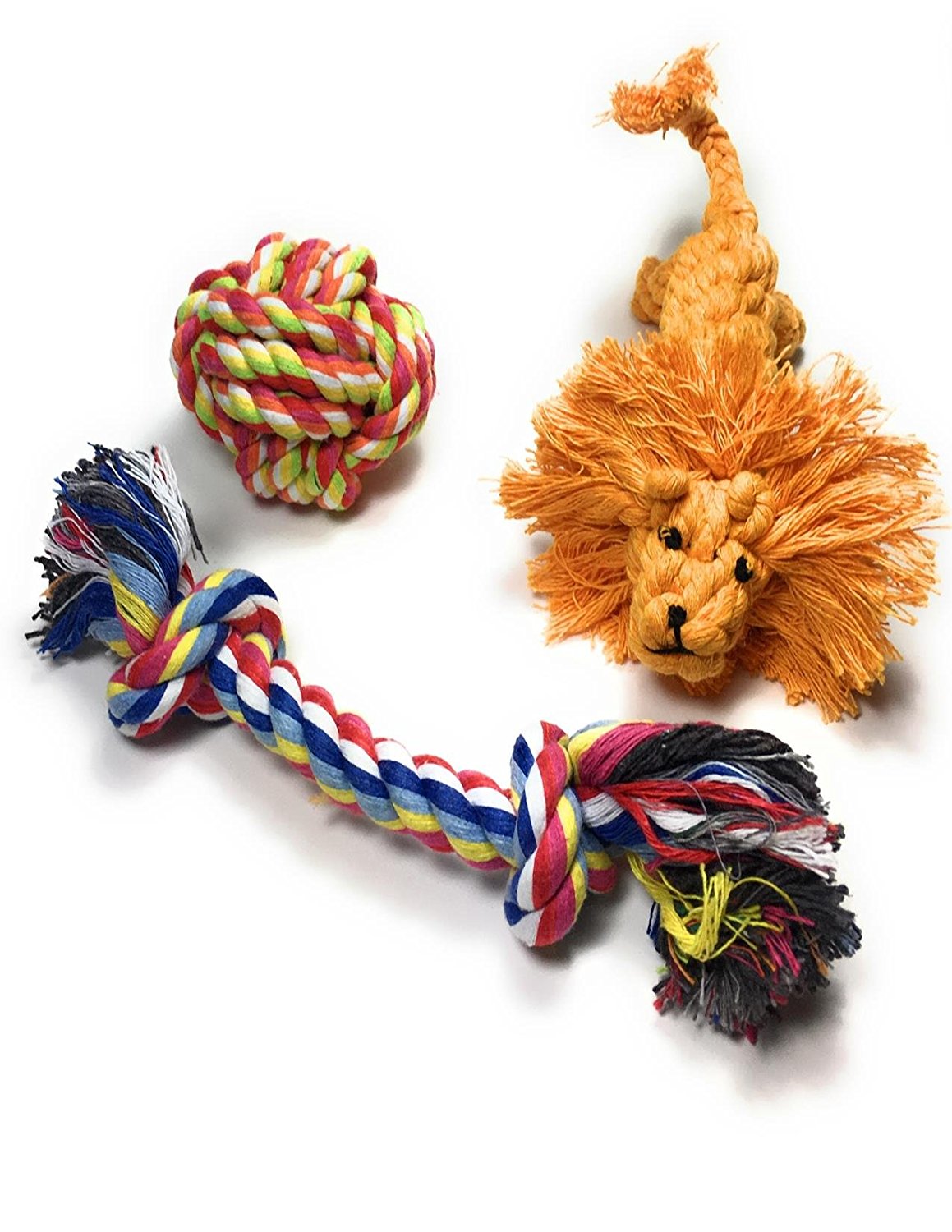
When your puppy is getting quite excited that may not be possible, and you’ll need to put some physical space between you.
If you are on the floor with the puppy stand up.
And if you are standing up, turn and walk away from the puppy.
If he follows and starts biting again step over a barrier so that he can’t get at you.
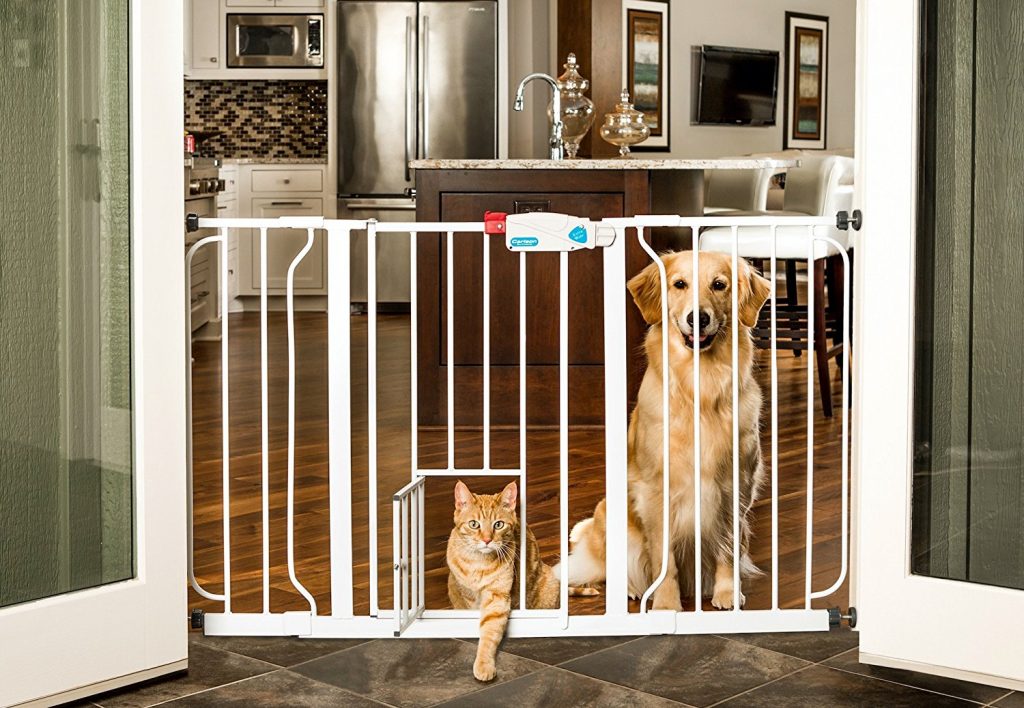
This is where dog gates come in very handy with small puppies. A standard baby gate works fine for most breeds of dog.
Managing the puppy
You may have to pick up your biting puppy to remove him from the scene (if he is biting your children for example, rather than you)
If he bites your hands and clothes as you try to restrain him, put him on the other side of a barrier or in his crate or puppy playpen for a short while.
Although the puppy does learn from them, these are useful management techniques to enable you to control the situation.
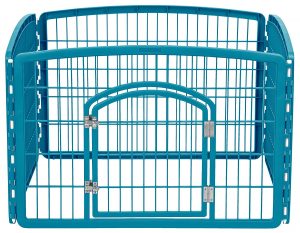
They help you to keep your puppy calm, and prevent the biting escalating through over excitement.
Over-excited puppies
Puppy play biting is directly linked to excitement. The more excited your puppy gets, the more and the harder he will bite.
And the harder it will be to interrupt and distract him.
Rough play excites puppies and noisy play does too.
Children tend to squeal when they play and get very physical with puppies.
One of the first rules they need to learn when playing with dogs, especially big dogs, is to stand up and stand still when the game gets too much.
This standing tall, still and upright is a dog body language signal and it means ‘play stops now’
Limiting rough play
It is also important that you manage the amount of time your puppy spends with people who get him over excited.
This usually includes small children
And will probably include a proportion of your visitors who simply won’t be able to resist squirming around on the floor with the puppy.
Limit such play and call a halt to it if your puppy is biting.
With medium to large breed dogs, physical rough and tumble play is not a great idea.
It can lead to dogs bowling people over or humping them, neither of which is very pleasant.
Stopping play when it gets rough is a good management strategy and it is a form of training too.
Over time, your puppy learns that biting and rough play loses him his playmates and that people simply leave if he is being mean.
When do puppies stop biting?
Many puppies have stopped biting completely by six months of age and biting is usually subsiding by the time that the puppy is heading towards five months old.
This is if the puppy has been managed appropriately
If people have been exciting him, or rewarding him for attention seeking behavior then biting can persist
And it can be much more of a problem in bigger stronger puppies than in little ones. We’ll look at that in a moment.
You can hasten the point at which your puppy has stopped biting altogether by some ‘no bite’ training
Let’s look a structured training exercise that actually teach puppies not to bite.
Training Puppies Not To Bite
The idea of this exercise is to teach a puppy to accept being stroked and handled in any way, without touching us with his teeth.
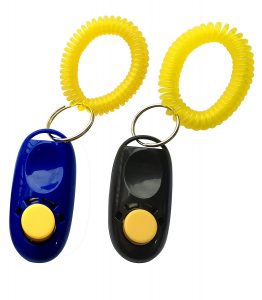
You’ll need to choose an event marker that tells your puppy you liked what he just did.
The event marker is a distinctive sound. I suggest you use the word ‘YES’, but a clicker is also and excellent choice
He gets a treat immediately after the event marker, and no treat if he doesn’t hear it.
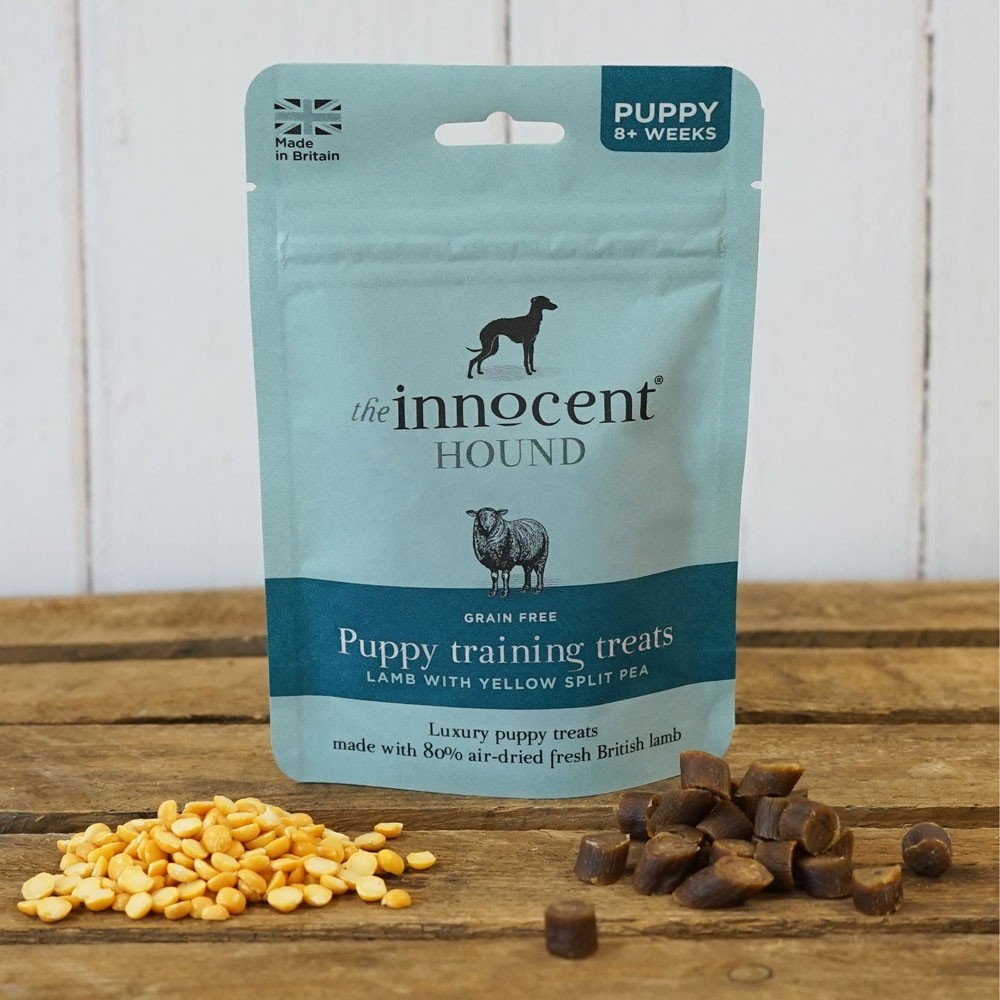
So for example – if you put your hand out near his face and he goes to nip or even mouth your fingers, you say nothing – just take your hand away
But if you put your hand out near his face and he sits still and doesn’t attempt to mouth you, then you say YES and give him a treat.
Your aim is to be able to stroke your puppy’s face and ears.
Even around his mouth, without him making any attempt to bite you. But don’t expect to get there in one go.
You’ll need to start with something less challenging, like a gentle movement of your hand nearby.
You can also make it easier for him by starting this training when he is calm and not distracted.
Later on you’ll be able to do it when he is more playful and even when he is excited. But for now, keep things simple.
No Bite Training Exercise
Here’s a summary of the first stages
-
Get your puppy’s attention
-
Move your hand towards him in the direction of his muzzle, but not close to him
-
If he moves his mouth towards your hand take your hand away and try again with more distance between you
-
If he ignores your hand say YES and give him a treat (put it on the floor)
If he can’t resist your hand no matter how far away it is, hold a treat over his head in your right hand and move your left hand towards him while he is focusing on the treat.
This is a type of ‘lure’ and you don’t want to do it too often.
It can be a good way of getting the training started so that you have chance to say YES and give the puppy the opportunity to learn what you want him to do.
Over the next few sessions, you can work on getting your hand closer and closer to the puppy.
Until you are brushing the sides of his face without him making any attempt to mouth or bite at you
Progress to touching and holding his collar, stroking his ears, grooming him, examining his paws and so on, all the time rewarding him for the correct behavior.
Anytime the mouthing returns, back up to a point where he can succeed and move forward more slowly again
Bite Inhibition Training
Some experts feel that puppies should be allowed to mouth and even bite gently for a week or two before being prevented from biting altogether.
Simply follow the instructions for managing your puppy (above) when he bites hard.
But allow him to mouth you when he bites gently without much pressure.
This is a great way to teach a dog excellent control over his mouth.
After a couple of weeks of this, you can progress to the training exercise I outlined in the previous section.
5 month old puppy biting to 6 month old puppy biting
Not so many puppies are still biting in a troublesome way at five or six months old, but those that are are usually causing their owners a lot of concern.
Older puppies that bite in play have often learned that this gets them a lot of attention.
They have discovered that people squeal and shout and get quite cross.
Sometimes these people push and shove the dog around which young dogs quite enjoy when they are playing.
For these dogs it is important that you stop all physical play, with all family members
If a puppy is biting hard at your hands when you try to interrupt his game.
Or an older puppy is getting out of hand biting at clothing, you need to put your puppy on a harness and house-line (a short trailing leash).
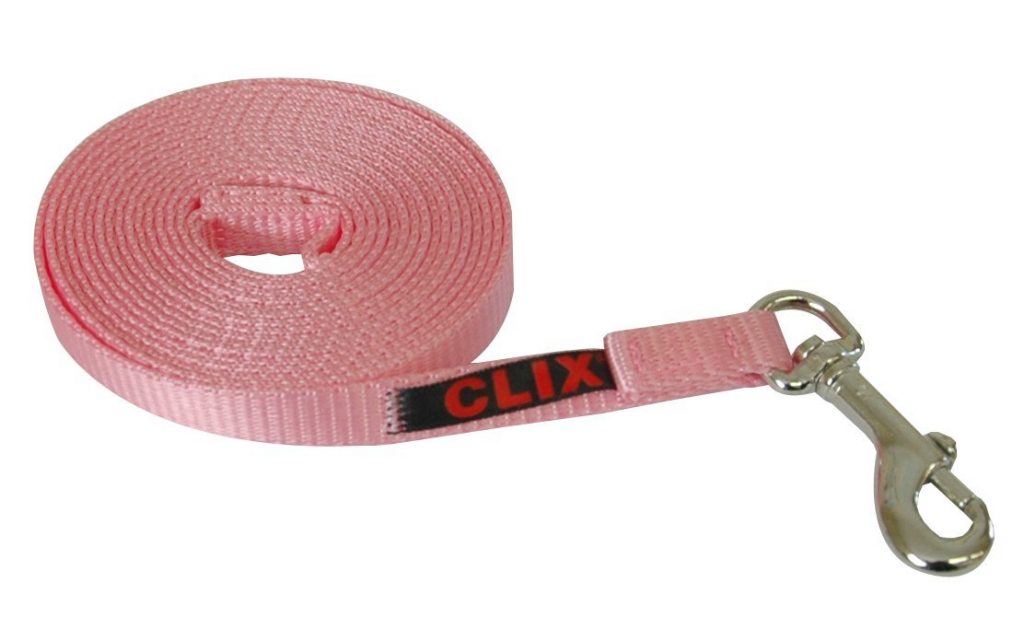
This will enable you to control your puppy, and take him to a calming place, without handling him.
You can just pick up the end of the line and lead him away.
Older biting puppies are often bright and bored.
And the best approach to avoiding future episodes of bad behavior is a structured programme of training and interesting activities.
A professional dog trainer using modern positive training methods will be able to help you with these.
Summary
So now you know some tips on how to stop your puppy from biting. The first few weeks can be tough with a determined biter in the house, but you will get through this and come out the other side.
A few months from now, this difficult period will be a distant memory
In the meantime, focus on keeping your biting puppy calm, avoiding too much rough play, and redirecting his biting onto appropriate toys and activities.
Spend some time on the training exercise set out above.
You’ll not only reduce biting but also build your puppy’s confidence in being handled and strengthen the bond between you.
